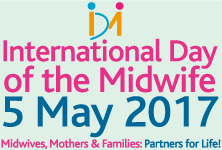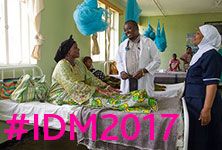IPTp &Malaria in Pregnancy Bill Brieger | 05 May 2017 03:58 pm
Supporting Midwives to Prevent Malaria on International Day of the Midwife
Midwives play at least two crucial roles when it comes to saving the lives of pregnant women in malaria endemic areas. First as the health staff responsible for providing intermittent preventive treatment for malaria in pregnancy (IPTp), midwives can ensure that women do not suffer the consequences and complications of malaria in the first place. Secondly, knowing that we may not be able to reach all pregnant women with the full package of malaria interventions in a timely manner, midwives are there to save lives from the complications to the mother and fetus arising from malaria-associated anemia and low birth weight. Today we focus on prevention.
 Today on the International Day of the Midwife is a good time to examine how to strengthen midwives’ roles in preventing malaria and protecting women from its consequences. This year’s theme, “Midwives, Mothers and Families: Partners for Life!” is in line with our overall concern about ending malaria through partnership at all levels.
Today on the International Day of the Midwife is a good time to examine how to strengthen midwives’ roles in preventing malaria and protecting women from its consequences. This year’s theme, “Midwives, Mothers and Families: Partners for Life!” is in line with our overall concern about ending malaria through partnership at all levels.
In providing antenatal/prenatal care (ANC) in stable malaria endemic areas, midwives are tasked with ensuring that pregnant women get an adequate number of doses of IPTp at the right time in their pregnancy. Previously only two doses were required, but now a pregnant woman can receive IPTp monthly from the beginning of the second trimester. The ability of the midwife to attract women to ANC and ensure that once there gets the required doses can be daunting.
A study in Uganda found that many pregnant women did not get the full regimen of IPTp and learned that several factors were responsible. Midwives’ education level and professional experience had a positive effect. Management issues such as the availability of safe drinking water and the drugs for intermittent preventive treatment were crucial. “Midwives who provided frequent health education to pregnant women, cooperated with village health team members and received in-service training were likely to provide effective anti-malaria services to pregnant women.” In short there are training and management interventions that can enable midwives to protect pregnant women better.
 Examination of malaria prevention in ANC clinics in Malawi showed that providers generally did have correct information about IPTp, but at times did know understand the exact timing of doses. They knew that those on HIV infection prevention prophylaxis should not take IPTp and that IPTp should be given as directly observed treatment, but in many clinics there were lack of official written guidelines to help them recall procedures post-training.
Examination of malaria prevention in ANC clinics in Malawi showed that providers generally did have correct information about IPTp, but at times did know understand the exact timing of doses. They knew that those on HIV infection prevention prophylaxis should not take IPTp and that IPTp should be given as directly observed treatment, but in many clinics there were lack of official written guidelines to help them recall procedures post-training.
Again, we can see that a variety of learning and management interventions can help midwives prevent malaria. Additional work in Uganda has shown the valuable role midwives can play as community health educators in encouraging ANC attendance and thus IPTp uptake. They need full support from the health system to do this important outreach.